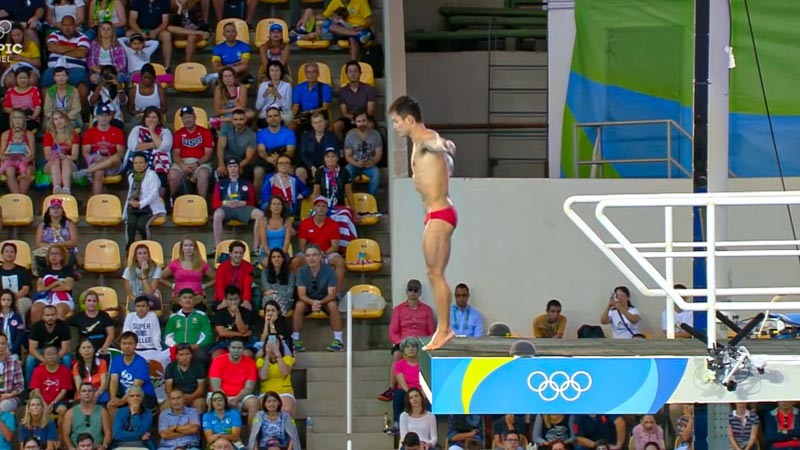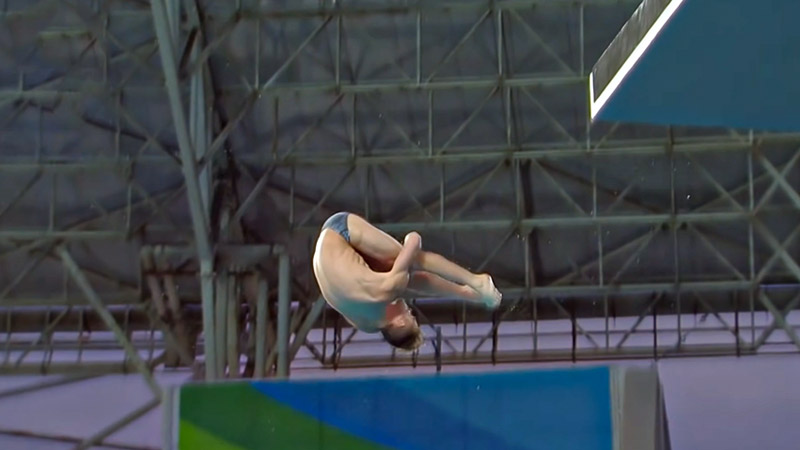In the captivating world of competitive diving, spectators might notice an intriguing element during score announcements: some scores are crossed out.
This isn’t a glitch or mistake but a deliberate part of the scoring process designed to ensure fairness and accuracy.
By eliminating the highest and lowest scores, judges aim to prevent any potential bias or manipulation, creating a level playing field for all competitors.
The scoring system in diving is meticulous, requiring judges to evaluate multiple aspects of a dive, from execution to synchronization.
In synchronized diving, for instance, the scores for each diver’s execution and the overall synchronization are carefully scrutinized.
By discarding the outliers, the system ensures that the final score truly reflects the divers’ performance without being skewed by extreme judgments.
This methodical approach underscores the sport’s commitment to precision and fairness, ensuring that only the most consistent and skillful performances shine through in the final tally.
The Basics of Diving Scoring
Diving scores rely on a meticulous system evaluating divers across several components.
By discarding the top two and bottom two scores, a fair representation emerges. Scores range from 0, indicating a complete failure, to 10, denoting excellence.
Approach
Divers begin with three or more steps towards the board’s end, resulting in a smooth yet forceful advance.
Judges value good form here, essential for setting the dive’s tone. Initiating this phase well predicts control during subsequent stages.
Takeoff
In takeoff, divers lift from the board, demonstrating control and balance. Proper angle control when leaving the springboard proves crucial for executing the dive effectively. Consistency in takeoff impacts overall performance and score.
Elevation
Elevation marks a diver’s height during the dive. Achieving appropriate elevation showcases power and ensures timing precision. Height influences subsequent dive phases, providing divers with more time for intricate maneuvers.
Execution
Execution involves body position and movement while in flight. Synchronization and fluidity during this phase affect both individual and synchronized events. A well-executed dive displays skills critical for high scoring.
Entry
Divers culminate their dive by entering the water with minimal splash. A clean entry signifies effective control of the entire dive sequence. Judges award higher scores when entry into the water reflects precision and finesse.
The Scoring System in Diving

The scoring system in diving includes multiple components designed to ensure fairness and precision. Several judges evaluate a dive, looking at both individual performances and synchronized efforts.
Dive Identification
Each dive is assigned a unique identification based on its characteristics. Judges and officials use these identifiers to reference specific dives, ensuring consistency during scoring.
Degree of Difficulty (DD)
The Degree of Difficulty, or DD, quantifies how challenging a dive is. Dives earn a DD score through a formula that considers factors like the number of somersaults, twists, and the dive’s approach. Higher DD scores indicate more complex dives.
Judges’ Panel
In diving events, a panel of judges plays a crucial role. Seven judges assess individual dives, while synchronized events involve additional judges for execution and synchronization. This structure aims to uphold consistency across performances.
Scoring Elements
Judges evaluate dives based on several elements. These include the approach, takeoff, flight, and entry into the water. A dive’s success depends on the execution across all these components.
Execution Scores
Execution scores focus on the technique displayed by divers. Each judge scores between 0 and 10, considering the precision and fluidity of the dive. The highest and lowest scores get discarded to minimize bias.
Difficulty Score
The difficulty score is crucial in calculating the total score. After determining the execution score, it’s multiplied by the dive’s DD rating. This step ensures dives are assessed on both their execution and complexity.
Total Score
For individual events, the total score derives from multiplying the adjusted execution scores by the DD. In synchronized diving, synchronization scores also influence the total. These calculations yield a comprehensive assessment of the dive’s quality.
Cumulative Score
Divers accumulate scores across multiple dives. Officials tally these to determine standings as competitions progress. Consistent performance in multiple rounds is essential for achieving a high cumulative score.
Final Ranking
Final rankings reflect the cumulative scores from all dives. The diver with the highest total secures top placement in the competition. This system rewards precision, difficulty, and consistent excellence throughout the event.
Rationale Behind Crossing Out Scores
In diving competitions, scores that are crossed out serve an essential purpose in maintaining fairness.
By eliminating extreme scores, the judging process ensures that no single viewpoint disproportionately affects a diver’s final score.
Preventing Outlier Influence
When judges score dives, outliers can skew results. To avoid this, both the highest and lowest scores are removed.
This method promotes balanced scoring, reflecting the diver’s true performance rather than the bias of one judge.
Specific Procedures for Score Elimination
Different sets of procedures for score elimination apply to individual diving events and synchronized diving events. Each type has a unique process to ensure consistent evaluation.
Individual Diving Events
In individual diving, seven judges score each dive from 0 to 10. The two highest and two lowest scores are discarded, leaving three scores that are summed.
This total is then multiplied by the dive’s degree of difficulty to ensure a fair assessment and minimize the influence of extreme scores.
Synchronized Diving Events
In synchronized diving events, 11 judges are involved in the scoring process. Three judges evaluate each diver’s execution, five judge synchronization, and one median score from both execution and synchronization is used.
These scores are then combined and multiplied by the degree of difficulty, ensuring a fair assessment of both individual ability and team coordination.
The Olympic Diving Scoring System
The Olympic diving scoring method is meticulously designed to ensure precision and impartiality. Each dive gain scores that reflect technical attributes and synchronization elements.
Scoring in Individual Events
Individual events undergo scoring by a panel who evaluates distinct dive components, from takeoff to water entry.
- Judging Panel: Individual diving events are scored by a panel of seven judges.
- Scoring Scale: Judges evaluate each dive using a scale ranging from 0 (completely failed) to 10 (excellent), incorporating half-point increments. The scoring is based on the following categories:
- Excellent: 10
- Very Good: 8.5 – 9.5
- Good: 7 – 8
- Satisfactory: 5 – 6.5
- Deficient: 2.5 – 4.5
- Unsatisfactory: 0.5 – 2
- Completely failed:
- Score Calculation:
- Once all scores are submitted, the highest two and lowest two scores are eliminated.
- The remaining three scores are summed to calculate the execution score.
- The execution score is then multiplied by the dive’s degree of difficulty (DD), which ranges from 1.2 to 4.1, to calculate the total score for that dive.
- Evaluation Criteria: Judges consider four main components during their assessment:
- Approach/Starting Position
- Take-off
- Flight
- Entry into the water
Scoring in Synchronized Events
In synchronized events, the scoring system evaluates both individual execution and team coordination.
- Judging Panel: Synchronized diving events involve a larger panel of eleven judges.
- Score Distribution: Three judges individually evaluate each diver’s execution, while five judges assess the synchronization between the divers.
- Score Calculation:
- Similar to individual events, the top and bottom scores for each diver’s execution are discarded, along with the highest and lowest synchronization scores.
- The median execution score for each diver, along with the three synchronization scores, are added together.
- This total is multiplied by 0.6, aligning it closer to individual event scoring, and then multiplied by the dive’s degree of difficulty.
- Synchronization Evaluation Criteria: In addition to the standard execution criteria, judges also evaluate:
- Similarity in height during take-off
- Coordinated timing during flight
- Similar angles of entry into the wate
FAQ
Has Anyone Scored a 10 in Diving?
Achieving a perfect 10 in diving signifies an “excellent” performance due to flawless execution and technical precision. Although rare, some divers have achieved this score in various competitions.
What Is the 120 Rule in Diving?
The “120 rule” refers to the point at which the sum of all scores from a dive shouldn’t exceed the maximum achievable when factoring in the degree of difficulty. This ensures that scoring reflects both a dive’s complexity and execution.
What Is the 1 3 Rule in Diving?
The “1 3 rule” involves scoring consistency across judges. When assessing a dive, they discard the highest and lowest scores to minimize bias, leaving scores from the majority—often totaling three in individual dives—to determine the final evaluation.
What Is a Good 6 Dive Score?
A good score for six dives, particularly in men’s events, varies based on the competition level and degree of difficulty.
In top-level competitions, scores exceeding 500 points are considered excellent, reflecting consistent high performance across dives.
Who Is the 14 Year Old Diver Perfect Score?
Identifying a 14-year-old diver with a perfect score highlights exceptional skill at a young age. These outstanding divers often catch public attention for their technical brilliance and representation in youth diving events.
Wrapping Up
The practice of crossing out scores in diving underscores the sport’s commitment to fairness and precision.
By eliminating outliers, the scoring system ensures that divers are judged accurately, reflecting their true capabilities.
This meticulous approach, involving multiple judges and detailed evaluations, highlights the importance of both individual skill and teamwork, especially in synchronized events.
Such a comprehensive system not only maintains the integrity of the sport but also celebrates the excellence and dedication of divers worldwide.







